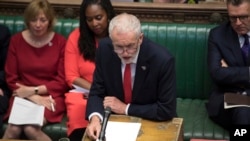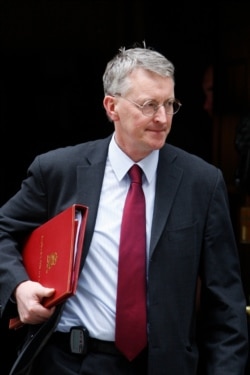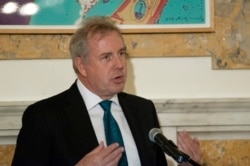Britain's main opposition Labour Party said Tuesday that the country's soon-to-be chosen new leader should hold a second referendum on whether to leave the European Union or remain in the bloc, as the two contenders for the job prepared to face a grilling in a TV debate over their plans to break Britain's Brexit gridlock.
In a significant shift, Labour leader Jeremy Corbyn said the party would campaign to stay in the EU if a referendum were called by whoever succeeds Prime Minister Theresa May. She announced her resignation last month after failing to get Parliament to back her divorce deal with the EU.
Lawmakers Boris Johnson and Jeremy Hunt are competing to replace May as Conservative Party leader and prime minister. The winner of the contest is due to take office later this month and will have barely more than three months to win support for a Brexit deal before Britain's scheduled Oct. 31 departure date.
In a letter to party members, Corbyn said that the new prime minister “should have the confidence to put their deal, or no-deal, back to the people in a public vote.”
“In those circumstances, I want to make it clear that Labour would campaign for Remain against either no-deal or a Tory deal that does not protect the economy and jobs,” he said.
Labour's opponents — and many supporters — have accused the party of dithering over Brexit for fear of alienating voters on either side of the national divide over Europe. Corbyn, a longtime critic of the EU, has resisted calls for a second referendum, saying Labour must respect voters' 2016 decision to leave.
The left-of-center party has previously rejected May's deal but also ruled out leaving the EU without an agreement and called for an election that the party hopes will bring a Labour government to power.
But the party's poor showing in recent local and European elections suggests Labour is losing support to parties including the Liberal Democrats and the Greens that advocate remaining in the EU.
Corbyn's letter clarifies the party's position — up to a point. It's still unclear what Labour would do about Brexit if it formed a government.
Labour lawmaker Hilary Benn, who heads Parliament's Brexit Committee, said “this is a very significant moment.”
“We saw what a lack of clarity did to Labour in the European elections. We got 14% of the vote,” he said.
But John Mann, a Labour legislator who backs Brexit, said the shift would cost the party support in areas of the country that voted strongly to leave the EU.
“There's no indication whatsoever that voters in my area ... have changed their mind,” he said.
“I’ve asked repeatedly of Jeremy Corbyn, what will be Labour's policy at a general election? I haven't been clear and I'm not clear now.”
Tory contenders Hunt and Johnson were due to square off later Tuesday in their only head-to-head debate in the campaign.
Both vow to succeed where May failed and take Britain out of the EU — even if that means leaving without an agreement on divorce terms and future relations.
Most businesses and economists think a no-deal Brexit would plunge Britain into recession as customs checks take effect at U.K. ports and tariffs are imposed on trade between the U.K. and the EU. But many Conservatives think embracing a no-deal Brexit may be the only way to win back voters from the upstart Brexit Party led by Nigel Farage.
Growing concern about the chance of a no-deal Brexit and signs that the British economy could be heading toward recession have weakened the pound, which fell Tuesday to $1.2440, near a two-year low.
Bookies and pollsters make Johnson, a populist former mayor of London, the strong favorite over the stolid Hunt.
Hunt has expressed frustration at the reluctance of Johnson to take part in debates. He hopes Tuesday's showdown offers a chance to turn the contest around, though it may be too late. Ballot papers have already gone out to the party's estimated 160,000 voting members, many of whom have already made their choice.
The two candidates are also likely to face questions about a fierce row over leaked cables from Britain's ambassador in Washington offering unflattering assessments of President Donald Trump's administration.
In the memos, Ambassador Kim Darroch called Trump's White House dysfunctional, inept and chaotic. The president let rip with tweets branding Darroch “very stupid” and “a pompous fool,” and saying the administration would no longer deal with him.
Trump also renewed criticism of May's handing of Brexit. In contrast, he has spoken warmly of both Johnson and Hunt.
Hunt, who is Britain's foreign secretary, reprimanded Trump, tweeting that his comments were “disrespectful and wrong to our Prime Minister and my country.”
Hunt wrote that “allies need to treat each other with respect,” and said that “if I become PM our Ambassador stays.”
His tone contrasted with that of Johnson, his predecessor as foreign secretary. Asked about Trump's criticism of May, Johnson said, “Myself, I have said some pretty critical things about the Brexit negotiations so far.”
“I think it's very important that we have a strong relationship with our most important ally,” he said.






